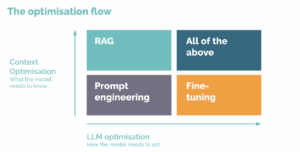
Our third annual State of Link Building Report has dropped, and it’s bigger than ever.
We surveyed 270 SEO professionals working agency-side, in-house and in consultancy roles, asking them about their favourite link building tools, which link metrics they value most and what success looks like.
You can grab the full PDF here, but for our key link building takeaways for 2022, stay right here…

1. Ahrefs is by far the most popular tool for link building
We’ve got a lot of choice when it comes to link building tools. Moz, SEMrush, Screaming Frog—even Google Sheets if you’re on a budget.
However, the undisputed leader of SEO tools was by far Ahrefs, with 82% of respondents using it. SEMrush, the second most popular paid SEO tool, is used by 56% of SEOs, well short of Ahrefs.

“I'm so happy to see this stat. Ahrefs has been my ride-or-die for link building. I do think a lot of their features are under-used. For instance, the content explorer is an absolute goldmine. I use it to dig up diamonds from Pinterest, and I use non-topical words (like "how many") to reverse engineer linkable assets.”
Bibi Raven, Link Builder at BibiBuzz
With such a big lead over the competition, it’s unsurprising that Ahrefs was also the clear winner among the respondents when they were asked which tool they’d choose if they could only use one: Ahrefs secured 51% of the vote, while SEMrush was a distant second with just 9%.
2. Domain Rating is still the most popular metric for measuring a link’s quality—and by a bigger margin than last year.
With Ahrefs being the most commonly used link building tool, it makes sense that their primary metric, Domain Rating (DR), is the most popular measure of a link’s quality.
Last year’s report also had DR leading the way, with 61% of respondents ranking it as their number one metric, with Moz’s Domain Authority (DA) in second place with 49%.
DR increased its lead over DA in 2022, with 67% of SEOs now favouring it versus 42% for Moz’s benchmark metric.
These two metrics were also the most popular choice if the respondents could only use one metric, with 44% and 18% of the vote respectively.
Despite these results, a number of our experts were surprised by the continued prominence of DR/DA.

"I am always surprised by the importance people assign to these domain-level metrics. Domain-level metrics tell you very little about the value of the website section or the specific URL you are trying to get a link from."
Martin Vasko, Senior SEO Manager at Avast & Marvas.sk
3. A single link takes around 1-2 hours to build
Building links has never been quick and easy, and on the whole our survey respondents reported the time it takes to build a link to be around 1-2 hours.
If you needed to put a time estimate on how long it takes you to secure a single link, how long would you say it takes?
Knowing how long, on average, it takes to build a link makes it easier to determine the true cost of link building to your business or your clients.
4. More than two thirds of SEOs report on nofollow links and brand mentions…
The received wisdom in the SEO community is that followed links are the best way to shift the rankings needle, but almost 7/10 link builders are also reporting on nofollow links, including sponsored and UGC attributes, and brand mentions.
What’s more, 62% actually count them towards their overall link target.

"Follow links are the crème de la crème when it comes to link building, but studies have shown that NoFollow links have been found to have some impact."
Chloe Hutchinson, Creative & Digital PR Team Lead at Aira
5. … and a massive 80% think brand mentions influence organic search
Despite there being no clear evidence that unlinked brand mentions influence organic rankings, 8/10 respondents believe they do.
Brand mentions is something we report on here at Aira, but one thing is for sure—brand mentions are a great source of link building opportunities! We use tools that will monitor the web for new references to your brand name. We then reach out to the site that mentioned you and ask if they’d be happy to link back to your homepage or most relevant web page—more often than not, they do!
6. Links aren’t going anywhere: 94% think links will be a ranking factor in 5 years time, and 73% in 10 years time
Links have been the number one driver of SEO for years now, and our survey respondents don’t see that changing anytime soon.

"I'm sure quality, topic-related and good backlinks will be always a ranking factor."
Veronika Höller, Senior SEO Manager at CompuGroup Medical
Almost all of the SEOs we spoke to think links will be a key ranking factor in five years time, while a big majority also think they’ll be important in 10 years time.
7. Topical relevance of a page and domain are the most important factors in determining link quality
As we all know, not all links are created equally. Let’s consider an example.
An organisation in the travel industry receives two new links to their blog about the leisure and tourism market in 2022. One is from a company in a different niche, with a Domain Rating of 95. The other is from a website with a DR of just 48, but the company is also in the travel sector. Which would be more valuable for SEO?
According to our survey respondents it would be the latter.
They cited topic relevance as the two most important factors: first of all page relevance (62%) and secondly domain relevance (52%).
What factors do you think are most important when determining whether a link is topically relevant or not? - with title

"Here I would consider both equally, the domain and topic of content. As some spammy websites/domains add content that may fit with my content, but it would hurt my overall quality."
Heba Said, Senior SEO Specialist & Consultant at Canva
8. Only half of SEOs are using disavow files
The question about maintaining a Google Search Console disavow file split our respondents almost straight down the middle: 51% using them, versus 49% that don’t.
Is this because a lot of digital marketers aren’t sure how to use it, or because Google has been discouraging their use?

"In my opinion, the disavow file is not used correctly most of the time [...] [and] Google keeps saying that disavowing is not important and they know what is a good link and what is a bad link."
Mercy Janaki, SEO Group Head at Webenza
9. Almost 7/10 think buying links positively influences rankings
Despite purchasing links being in violation of Google’s Webmaster Guidelines, as well as the search giant also warning they can negatively impact a site’s rankings, 69% of SEOs we asked think they can positively influence rankings.
“From my point of view, it is a mistake to use paid backlinks. The algorithm is too smart for this tactic. We are in 2022, not in 2005,” said Veronika Höller, Senior SEO Manager at CompuGroup Medical. However, Veronika is in the minority.
Does this suggest Google’s algorithm simply can’t identify when a link has been paid for?
10. It’s typical for campaigns to generate less than 10 links
Although we might dream of generating hundreds of links with our incredible content, the truth is the majority of campaigns won’t break 20. In fact, 53% of our respondents reported they’d generated between one and nine links from a content-led link building campaign within the last 12 months, while 29% had run a campaign that received zero links.

"I'm relieved to see so many of the campaigns sitting around the 1-9 links mark. We all know that not every campaign flies and we all have our flops, but sometimes it can feel like you're failing your job when you have a campaign that "underperforms"."
Abi Bennetts, Digital PR Manager at Propellernet
With this in mind, if you’ve been disappointed by the performance of a link building campaign, don’t beat yourself up about it too much.
11. Long form content is most effective for generating links
Not securing enough links from your outreach? Maybe your content isn’t in-depth enough.
Our survey found that 56% of SEOs believe long-form, report style content is the most effective for link building.
An interactive piece of content wasn’t far behind (42%), while blog posts (39%) and static infographics and press releases (both 27%) made up the rest of the top five.

"As an industry over the last couple of years especially, I've definitely noticed a larger focus on methodologies and producing more in-depth content, so the love for long-form content doesn't surprise me."
George Driscoll, Digital PR Consultant at Root Digital
Want to discover all of the insights from the 2022 State of Link Building Report? Follow that link or download the PDF below.







